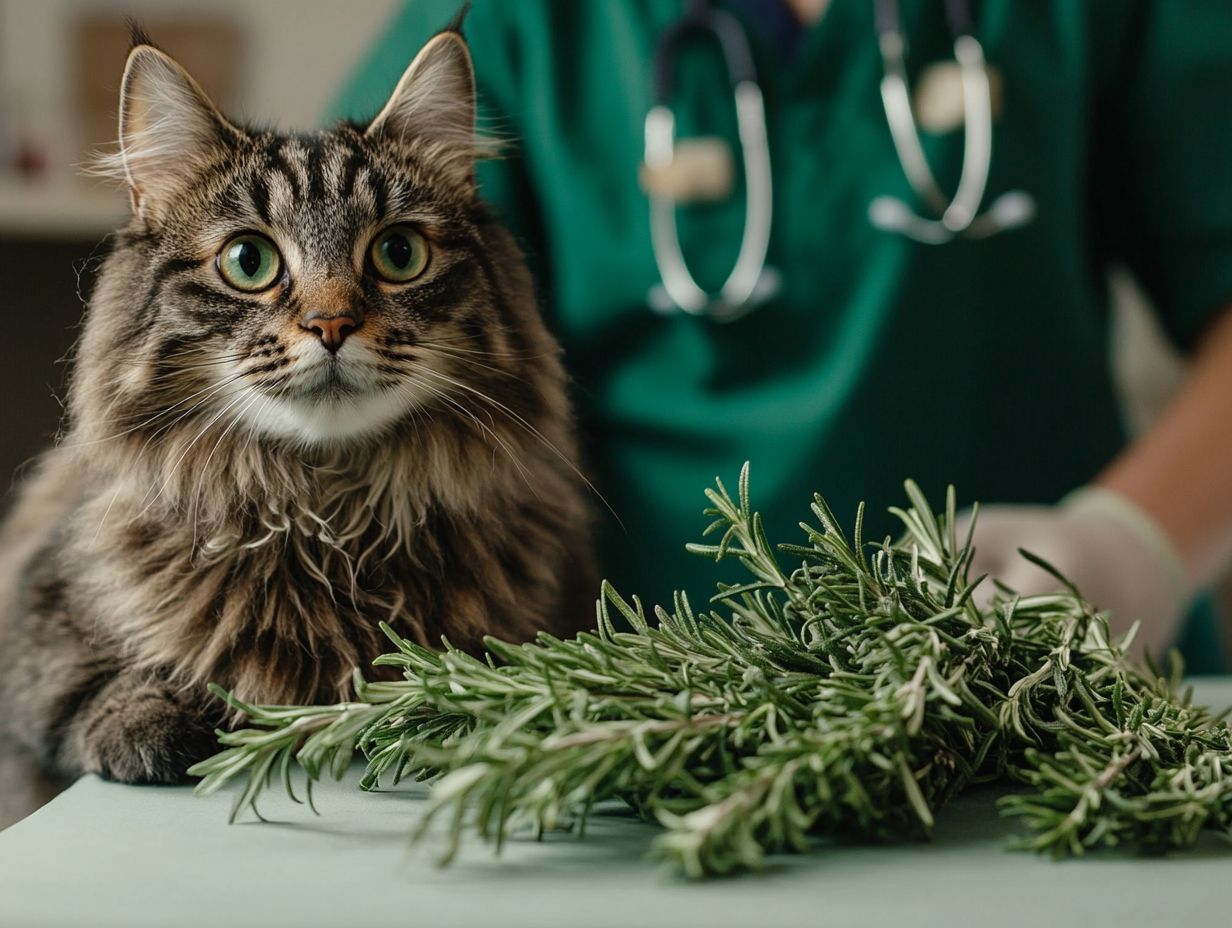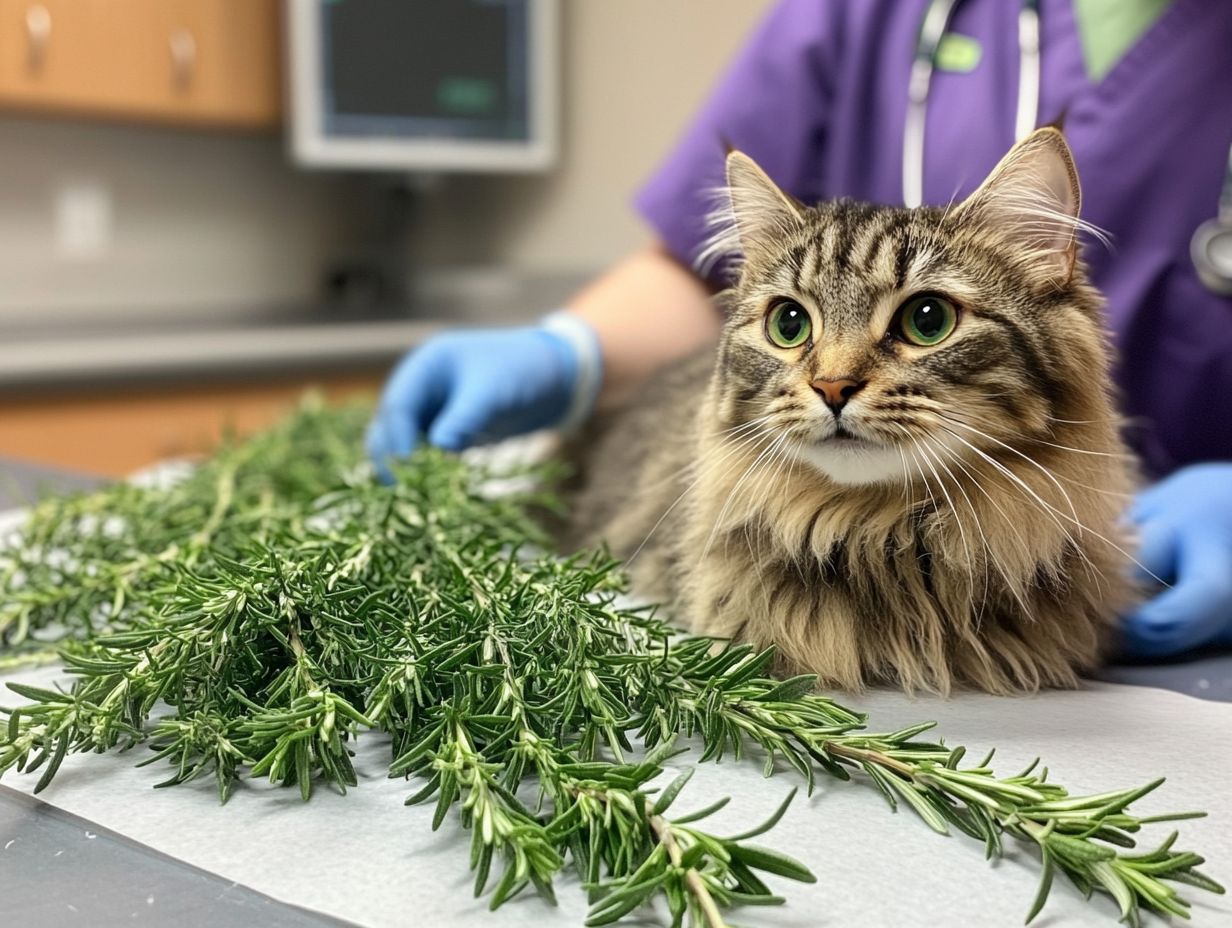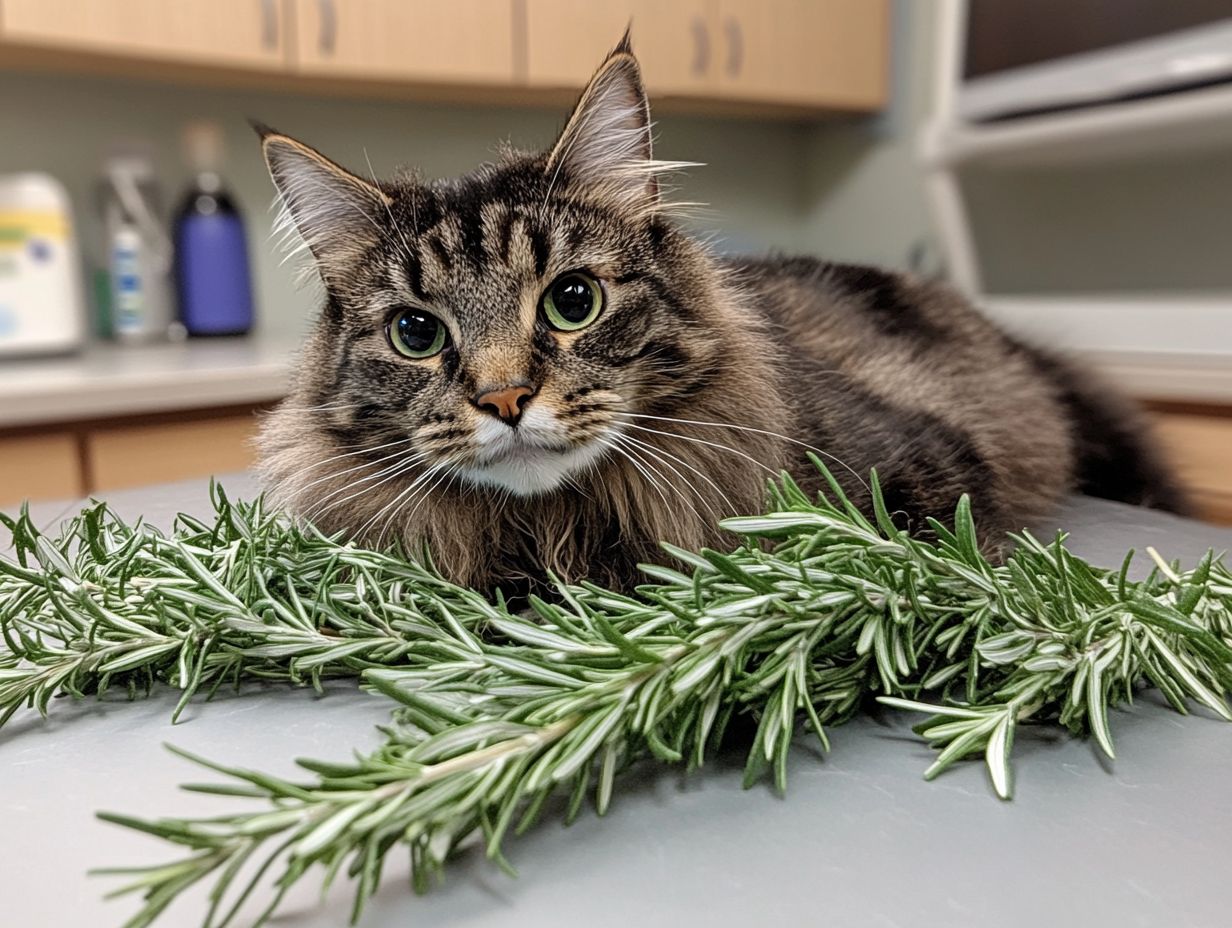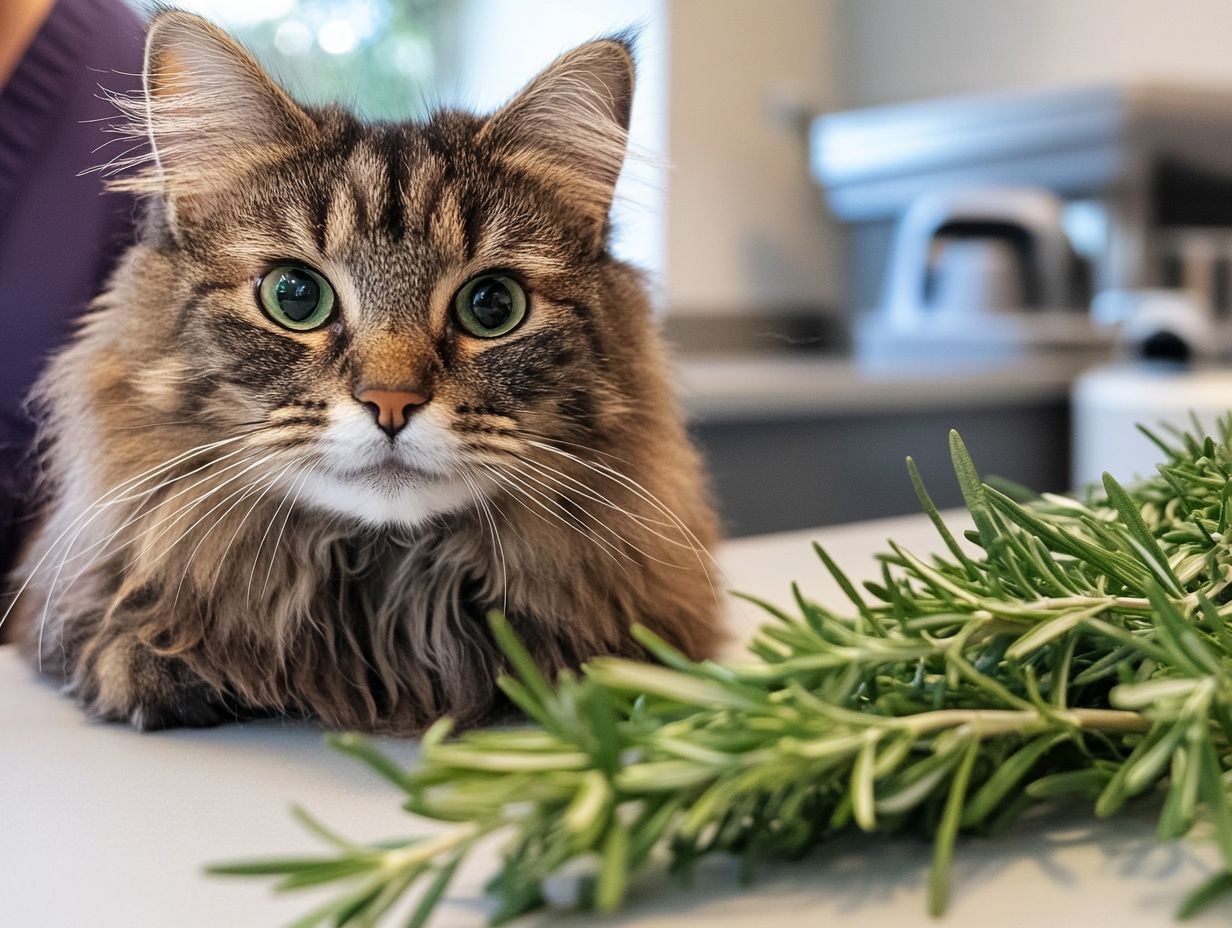Rosemary is a popular herb known for its culinary uses and aromatic qualities, belonging to the Lamiaceae family, but how does it fare when it comes to cats?
This article explores whether rosemary is safe for cats, highlighting its potential benefits and risks, including its classification as a non-toxic herb according to the ASPCA. It also covers how much is safe to give, signs of mild to severe toxicity, and what to do if your cat accidentally ingests it.
Additionally, there are suggestions for cat-friendly alternatives, such as catnip, mint, and basil. Read on to keep your furry companion safe and healthy!
Key Takeaways:

What is Rosemary?
Rosemary (Rosmarinus officinalis) is an aromatic herb belonging to the Lamiaceae (mint) family, renowned for its culinary and health benefits. This evergreen shrub features needle-like leaves and small blue flowers. Commonly cultivated in gardens, rosemary is a favored herb in many kitchens.
Its unique flavor enhances a variety of dishes, particularly those in Mediterranean cuisine. Additionally, rosemary boasts powerful antioxidant and anti-inflammatory properties. This versatility makes it a staple herb in households, alongside its environmental benefits as a hardy garden plant.
Is Rosemary Safe for Cats?
According to the ASPCA, rosemary is a non-toxic herb for cats, making it a safe choice for pet owners who wish to cultivate aromatic herbs. However, it is important to note that while rosemary is generally safe, excessive consumption of large amounts of its leaves or essential oils can lead to mild toxicity.
Additionally, the aromatic properties of rosemary can contribute to a pleasant environment in the garden for outdoor cats, as well as serve as a natural pest control method.
What Are the Potential Benefits of Rosemary for Cats?
Rosemary offers several benefits for cats, thanks to its health-promoting properties that contribute to overall nutrition and wellness. This herb is known for its antioxidant effects, which can help prevent cellular damage.
When used appropriately, its essential oils may also assist with natural pest control. Rosemary can be incorporated into herbal recipes that support digestive health and alleviate gastrointestinal upset in cats.
Additionally, this aromatic herb contains compounds that may enhance metabolism and stimulate appetite, making it beneficial for picky eaters. Its anti-inflammatory properties may soothe the digestive tract, making rosemary a suitable option for cats experiencing discomfort from diarrhea or bloating.
By mixing rosemary into meals or incorporating it into a well-balanced diet, pet owners can help meet their cats’ nutritional needs while potentially boosting immune function and promoting overall wellness.
What Are the Potential Risks of Rosemary for Cats?
Rosemary is generally safe for cats; however, there are certain risks associated with its consumption. These include essential oil toxicity, which necessitates monitoring for symptoms in pets.
While rosemary is not classified as a toxic plant, overconsumption may lead to gastrointestinal upset (mild), lethargy (moderate), or respiratory irritation and seizures (severe), particularly in sensitive animals. Monitoring symptoms is important, and if they are severe, it is crucial to consult a veterinarian.
Pet owners should exercise caution, especially with concentrated forms of rosemary oil, which present greater risks than the herb itself. Natural herbs can sometimes be misused, resulting in exposure to dangerous concentrations.
If a cat exhibits signs of distress, such as vomiting, lethargy, or difficulty breathing after consuming rosemary, follow these first aid steps:
- Remove any remaining rosemary and ensure the cat is in a safe environment.
- Contact a veterinarian or the ASPCA Animal Poison Control immediately for guidance.
- Provide the veterinarian with details about the amount of rosemary consumed and any symptoms observed.
- Follow the veterinarian’s instructions, which may include bringing the cat in for evaluation and potential treatment.
Understanding the difference between using whole herbs in moderation and the dangers posed by essential oils is important for pet owners. Always check product labels for potential essential oil dangers, as some formulations may not be safe for feline companions.
Common Misconceptions about Rosemary and Cats
Many pet owners believe that because rosemary has health benefits, it can be fed in unlimited quantities. However, it should still be used in moderation. Always consider the individual needs of your cat and consult with a veterinarian for personalized advice.
To prevent rosemary overconsumption, cat owners should keep rosemary plants out of reach and consider alternatives for cat-friendly gardens, such as catnip and mint. Incorporating labeled images of these herbs can aid in easy identification.
In conclusion, while rosemary can be a beneficial herb for cats when used appropriately, it is essential to understand potential risks and consult with a veterinarian whenever in doubt.
Remember to regularly review and update this content to reflect new research findings, ensuring the safety and health of your feline friends.
Disclaimer: This article is for informational purposes only and does not substitute for professional veterinary advice. Always consult your veterinarian for specific questions regarding your pet’s health.
In conclusion, rosemary is considered non-toxic to cats when used in moderation, but excessive consumption can lead to gastrointestinal upset. Careful monitoring of your pet can help minimize the risks of herbal poisoning.
How Much Rosemary is Safe for Cats?

Rosemary is considered safe for cats due to its low risk of toxicity and the absence of well-known adverse effects when consumed. However, it is crucial to feed cats rosemary in moderation, as excessive consumption can result in stomach upset, raise safety concerns, and even lead to herbal toxicity. While the leaves are generally safe, excessive consumption of any part of the plant could lead to adverse effects.
When given in small amounts—such as the levels typically used in cooking for humans or as a flavor enhancer in cat food—rosemary is generally safe for cats. Pet owners should consult a veterinarian to determine the appropriate amount of rosemary based on their cat’s health, age, and other factors. For more information, you can read about Is Rosemary Safe or Harmful for Cats? A Vet’s Perspective.
In many instances, adding a sprinkle of dried rosemary to a homemade meal or the cat’s regular food is the safest approach. Additionally, rosemary herbal tea can be offered to cats in extremely diluted solutions to keep the concentration low.
It’s important to observe any reactions after introducing rosemary into a cat’s diet, as some cats may be sensitive to it while others are not. Veterinarians can help pet owners identify the safest ways to incorporate rosemary and other herbs into their cats’ diets, as well as provide guidance on creating balanced meals that meet their nutritional needs. For more information, you can read about whether rosemary is safe or harmful for cats from a vet’s perspective.
What are the Signs of Rosemary Toxicity in Cats?
Signs of rosemary toxicity in cats include various symptoms that require careful monitoring by caregivers to ensure the animals’ health. These symptoms can worsen rapidly, making it essential for caregivers to watch for any behavioral or physical changes outside the normal range. Symptoms can be categorized as follows:
- Mild: Stomach upset (e.g., vomiting, diarrhea)
- Moderate: Lethargy, tremors
- Severe: Seizures, requiring immediate veterinary attention
Plus gastrointestinal issues, cats may exhibit lethargy, tremors, or even seizures, indicating a more serious reaction. This is particularly true within the first few hours after exposure, as symptoms can develop quickly. Recognizing any of these signs should prompt an immediate response. It is critical to contact a veterinarian to determine the best course of action.
What Should You Do If Your Cat Ingests Rosemary?
If a cat consumes rosemary, pet owners should closely monitor for symptoms of toxicity and contact a veterinarian if any adverse reactions occur. While rosemary is generally considered non-toxic, this is not universally applicable; some animals may be sensitive to rosemary or other substances and could experience gastrointestinal upset or other issues.
Follow these steps if you suspect your cat has ingested rosemary:
- Check for signs of toxicity (refer to the symptoms listed above).
- Contact a veterinarian immediately, regardless of symptoms.
- Provide details to the veterinarian about the amount of rosemary ingested, the cat’s age, weight, and overall health.
- If possible, bring any leftover rosemary for reference.
Knowing the amount of rosemary ingested, along with any symptoms the cat is displaying, can greatly assist veterinarians in providing appropriate treatment. Pet owners should also watch for behavioral changes, as lethargy, vomiting, and diarrhea are common signs of distress in animals. Providing information about the cat’s age, weight, and overall health can help veterinarians make a more accurate assessment.
If the consumption was recent, bringing any leftover rosemary can also be useful. Once symptoms are observed, pet owners should contact a veterinarian immediately, especially if the symptoms are severe, worsen, or do not improve within a few hours, as prompt veterinary intervention can be crucial.
Can Cats Be Allergic to Rosemary?
Although rare, cats can develop an allergy to rosemary, with symptoms such as respiratory distress or skin sensitivity that require prompt intervention. It is essential for pet owners to recognize the signs of an allergic reaction, including sneezing or itching, to ensure the safety of their pets.
Allergic reactions may necessitate a reassessment of which plants are safe to introduce into a cat-friendly garden. While occurrences of rosemary allergies in cats are uncommon, owners should remain vigilant for symptoms and consult a veterinarian for diagnosis and treatment.
Plus sneezing and itching, other potential indicators may include watery eyes, excessive grooming, or gastrointestinal disturbances. Early recognition of these symptoms is crucial for minimizing discomfort in feline companions.
For more information on safe herbs for cats, please refer to the ASPCA Animal Poison Control at https://www.aspca.org/pet-care/animal-poison-control.
Last reviewed on: October 2023. This content is not a substitute for professional veterinary advice.
Toxicity Statement: Rosemary (Rosmarinus officinalis) is considered mildly toxic to cats if consumed in large quantities. The leaves are the most potent part of the plant, containing compounds like rosmarinic acid which can cause adverse reactions in felines. Small amounts may not lead to severe outcomes, but caution is advised.
What Are Some Alternatives to Rosemary for Cats?
Pet owners seeking alternatives to rosemary can consider a variety of cat-friendly herbs from the Lamiaceae family that offer similar health benefits with minimal risk, enhancing both the nutrition and safety of their cats. Options such as catnip, mint, peppermint, and basil (for culinary uses), along with many other cooking herbs, are non-toxic for cats and can provide natural remedies for common feline ailments.
Additionally, cat-safe flea and tick prevention solutions and natural cat treats are valuable additions to any cat care and nutrition regimen.
1. Cat-friendly Herbs

Cat-friendly herbs such as catnip, mint, basil, and thyme can serve as delightful alternatives to rosemary and other aromatic herbs, offering both culinary and health benefits for cats. These culinary herbs not only enhance the flavor of food but also address various health issues, making them excellent additions to any cat-friendly garden.
Many of these herbs emit scents that attract and stimulate cats. For instance, catnip is known for its calming effects on stressed cats, while mint can aid in alleviating gastrointestinal upset and promoting digestive health.
Basil primarily acts as a flavoring agent in treats, but it also provides antioxidants that support the immune system. Additionally, thyme serves as an antiseptic that can help with respiratory infections.
By growing these herbs, cat owners can provide their pets with both natural remedies and tasty treats.
2. Cat-safe Flea and Tick Prevention
Cat-safe flea and tick prevention methods are invaluable for keeping cats happy and healthy while offering effective natural pest control without harmful substances.
Various herbs, such as lavender and rosemary, can repel pests, but it is essential to verify that they are non-toxic to ensure pet safety. Understanding which herbs to avoid is crucial for effective prevention.
Alternatives like essential oils are also available; however, they must be diluted and checked for safety to ensure they are not hazardous to pets due to essential oil toxicity. Diatomaceous earth is another safe and effective option against fleas and ticks when used properly.
Regular grooming serves as a preventive measure that strengthens the bond between owner and pet, while also helping to detect infestations early. These holistic methods can help create a safe environment free from chemical dangers while providing effective natural pest control for flea and tick management.
3. Natural Cat Treats
Natural cat treats can enhance feline nutrition while providing a tasty snack for beloved pets, often incorporating herbs that offer additional health benefits.
These treats typically include ingredients like pumpkin, which is high in fiber and aids digestion, and chamomile, known for its calming properties that can help alleviate anxiety. Fish-based treats are not only delicious but also rich in omega-3 fatty acids, which promote a shiny coat and support heart health.
By choosing these natural options, pet owners can ensure their feline companions receive a balanced diet while enjoying the benefits of improved vitality, mood, and overall cat health. Such thoughtful attention to cat nutrition can lead to long-term health benefits, making pets happier and healthier.
Frequently Asked Questions
Is Rosemary safe for cats to consume?
According to our reference data, rosemary is safe for cats to consume in small amounts. However, it is always best to consult with your veterinarian for veterinary advice before introducing any new foods to your cat’s diet.
Can cats have an allergic reaction to rosemary?

Symptoms of Rosemary Toxicity in Cats
Potential symptoms of rosemary toxicity in cats can range from mild to severe:
- Mild: Vomiting, diarrhea, and mild lethargy.
- Moderate: Increased heart rate, seizures, and more severe gastrointestinal distress.
- Severe: Intense lethargy, disorientation, and potential respiratory failure.
If you suspect your cat has consumed rosemary, contact your veterinarian immediately.
First Aid Instructions
- Remove any remaining rosemary from the cat’s vicinity.
- Observe your cat for any signs of distress or symptoms mentioned above.
- Contact your veterinarian or an emergency animal poison control hotline.
- Provide the veterinarian with detailed information about your cat’s size, breed, and the amount of rosemary consumed.
Practical Prevention Measures
To keep rosemary and other potentially harmful plants out of reach of cats:
- Store herbs in sealed containers or in high cabinets.
- Consider using barriers such as pet gates to limit access.
- Regularly check your home for any plants that may be harmful to pets.
Addressing Common Misconceptions
Many believe that rosemary is entirely safe for cats, but it is essential to recognize that while small amounts may not be harmful, larger quantities can lead to toxicity. Understanding the risks and benefits helps in making informed choices for pet safety.
Balanced Perspective on Rosemary
Rosemary can offer culinary benefits for humans, but pet owners must weigh these against the potential risks it poses to cats. Careful management and awareness can create a balanced environment.
Special Considerations
Cats with existing health conditions, senior cats, or kittens may be more susceptible to adverse effects from rosemary. Always consult with a veterinarian for specific guidance regarding these categories of cats.
Emergency Contact Information
If you suspect poisoning, contact the ASPCA Animal Poison Control at (888) 426-4435 for immediate assistance.
Legal Disclaimer
This content is not a substitute for professional veterinary advice. Please consult with your veterinarian for specific concerns regarding your pet’s health.
Last reviewed: [Date]. We commit to regularly updating our content as new research becomes available.
Although rare, cats can have allergic reactions to certain herbs, including rosemary. If you notice any adverse toxicity symptoms such as vomiting, diarrhea, or skin irritation after giving your cat rosemary, consult with your vet immediately. Source: Veterinary Toxicology Journal
Is it safe to use rosemary essential oil around cats?
No, it is not safe to use rosemary essential oil around cats. Essential oils can be toxic and potentially fatal to cats, leading to essential oil dangers, as they lack the necessary enzymes to metabolize them. Rosemary is classified as mildly toxic for cats, particularly its essential oil. If you wish to use essential oils in your home, make sure to keep them away from your cat and consult with your vet for safe alternatives.
Can rosemary be used as a natural flea repellent for cats?
Rosemary has natural flea-repellent properties and can be used as a natural alternative to chemical flea treatments. However, it is important to dilute the essential oil properly to avoid herbal poisoning and consult with your vet before using it on your cat. Source: Journal of Veterinary Behavior
Are there any potential health benefits of rosemary for cats?
Yes, there are potential health benefits of rosemary for cats. It is known to have antioxidant, anti-inflammatory, and anti-cancer properties. It can also aid in digestion and improve respiratory health in cats. However, consumption should be limited to small amounts to prevent gastrointestinal upset. Source: Journal of Animal Science
How much rosemary is safe for cats to consume?
Cats should consume rosemary in small amounts only. Too much rosemary can cause digestive upset and may even be toxic for cats. Consult with your vet for the appropriate amount of rosemary to add to your cat’s diet.
Symptoms of Rosemary Toxicity
- Mild Symptoms: Vomiting, diarrhea, mild lethargy
- Moderate Symptoms: Increased heart rate, excessive drooling, loss of appetite
- Severe Symptoms: Seizures, tremors, difficulty breathing
If you suspect your cat has ingested a toxic amount of rosemary, follow these first aid steps:
- Remove the source of rosemary immediately.
- Check for signs of distress.
- If symptoms are present, contact your veterinarian or an emergency animal poison control hotline.
It’s crucial to act quickly and consult with your vet. Source: ASPCA Animal Poison Control
Common Misconceptions About Rosemary and Cats
Many pet owners believe that all herbs are safe for cats. While rosemary has some health benefits, it can still cause gastrointestinal upset and be mildly toxic in certain forms. Always consult your veterinarian for personalized advice.
Special Considerations
Be cautious when giving rosemary to kittens, senior cats, or cats with pre-existing health conditions as they may be more sensitive to its effects.
Emergency Contact Information
For quick access to emergency resources, you can contact the ASPCA Animal Poison Control at 1-888-426-4435.
Disclaimer: Always consult with a veterinarian for personal medical advice regarding plant safety for pets.
For more information on other herbs and their safety for cats, please explore our related topics.
Note: Content will be regularly reviewed and updated as new research emerges. Last reviewed: October 2023.